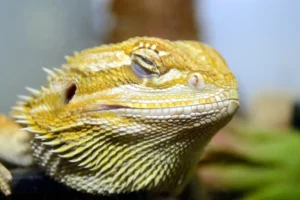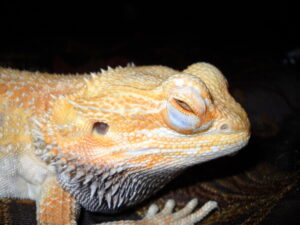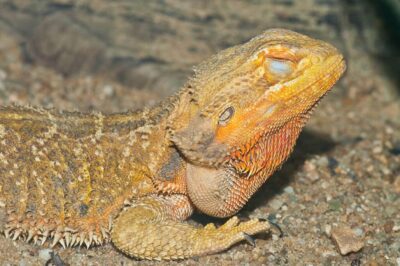When observing a bearded dragon, it’s not uncommon to see them with their eyes closed. This behavior can be puzzling to new owners, leading to concerns about their health or well-being. However, bearded dragon eyes closed is often a normal part of their behavior and can occur for several reasons.
From relaxation and sleep to potential health issues, understanding the context behind this behavior is crucial for ensuring your pet’s overall health. In this article, we’ll explore the various reasons why your bearded dragon might close its eyes, and how you can determine whether it’s a sign of something that requires attention or simply a natural part of their daily routine.
Normal Bearded Dragon Eye Behavior

Bearded dragons have a range of normal eye behaviors that can help you gauge their health and well-being. Here are some key points to look for:
- Clear and Bright Eyes: Healthy bearded dragons typically have clear, bright eyes. Dull or cloudy eyes can be a sign of illness or dehydration.
- No Discharge: There should be no excessive discharge or mucus around their eyes. Mild amounts of tear production are normal, but excessive discharge can indicate an issue.
- Normal Pupil Reaction: Their pupils should react to changes in light. They might constrict in bright light and dilate in dim light. If you notice that their pupils are always dilated or constricted, it could be a sign of health problems.
- Proper Blinking: Bearded dragons blink occasionally to keep their eyes moist and clean. This is normal behavior, but if you notice frequent blinking or squinting, it could be due to irritation or discomfort.
- Symmetry: Both eyes should look and behave similarly. If one eye looks different (e.g., swollen, sunken, or with different coloration), it may indicate an issue.
- No Signs of Infection: Watch for any signs of redness, swelling, or unusual behavior like rubbing their eyes against objects, which might suggest an infection or irritation.
If you notice any abnormalities or changes in your bearded dragon’s eye behavior, it’s a good idea to consult a vet who specializes in reptiles to ensure they’re in good health.
Reasons for Closed Eyes in Bearded Dragons
Bearded dragons might close their eyes for several reasons, ranging from normal behavior to potential health issues. Here are some common reasons:
- Sleep or Rest: Bearded dragons, like most animals, close their eyes when they are sleeping or resting. If your dragon is closing its eyes in a relaxed environment, it’s likely just resting.
- Shedding: During shedding periods, bearded dragons may close their eyes more frequently as they feel discomfort or irritation from the loose skin around their eyes.
- Lighting Conditions: Bright lights can cause discomfort, leading a bearded dragon to close its eyes. Ensure their habitat has proper lighting conditions and that they have a place to retreat from intense light if needed.
- Eye Irritation or Infection: Closed eyes can be a sign of irritation or infection. Look for other symptoms such as swelling, discharge, or redness. This could be caused by dust, substrate particles, or an infection.
- Dehydration: Dehydration can cause a bearded dragon to close its eyes. Ensure they are drinking enough water and their habitat has proper humidity levels.
- Stress or Fear: Bearded dragons might close their eyes when they are stressed or frightened. Ensure their environment is calm and free from disturbances.
- Pain or Discomfort: If a bearded dragon is experiencing pain or discomfort, it might close its eyes more frequently. This could be due to injury, parasites, or other health issues.
If your bearded dragon is frequently closing its eyes and you notice other signs of illness or discomfort, it’s a good idea to consult with a reptile vet to determine the cause and ensure proper care.
How to Assess and Monitor Eye Health

Assessing and monitoring your bearded dragon’s eye health involves observing several aspects of their behavior and physical appearance. Here’s a guide to help you keep track:
1. Routine Visual Checks
- Appearance: Ensure their eyes are clear, bright, and free from redness or cloudiness.
- Discharge: Look for any signs of discharge or mucus around the eyes.
- Pupil Reaction: Check if their pupils constrict and dilate appropriately in response to light changes.
2. Behavior Monitoring
- Blinking: Observe if they are blinking normally or if they seem to squint frequently.
- Eye Closure: Take note of how often and when they close their eyes. Frequent eye closure or squinting can be a sign of discomfort.
- Rubbing: Watch if they are rubbing their eyes against objects, which can indicate irritation.
3. Environmental Factors
- Lighting: Ensure that the lighting in their enclosure is appropriate and not too harsh. They should have access to a shaded area.
- Humidity: Maintain proper humidity levels in their habitat to avoid dryness or irritation.
- Cleanliness: Keep the habitat clean to reduce the risk of eye infections from dust or debris.
4. Health Signs
- Swelling or Redness: Check for any swelling, redness, or abnormal changes in eye color.
- Behavioral Changes: Monitor if there are any changes in their activity levels, appetite, or general behavior that might indicate discomfort related to eye health.
5. Handling and Interaction
- Gentle Handling: When handling, be gentle around the head and eyes to avoid causing irritation.
- Observe in Different Settings: Watch their behavior in various lighting conditions to understand if their eye health is affected by environmental changes.
6. Veterinary Check-ups
- Regular Vet Visits: Schedule regular check-ups with a reptile vet to monitor overall health and catch any potential eye issues early.
- Consult on Concerns: If you notice any abnormalities or persistent symptoms, seek advice from a vet.
By keeping an eye on these factors and maintaining a clean, well-regulated environment, you can help ensure your bearded dragon’s eyes stay healthy.
Preventive Care Tips
Preventive care is crucial for maintaining the health and well-being of your bearded dragon. Here are some tips to help you provide the best care:
1. Proper Habitat Setup
- Temperature and Lighting: Maintain appropriate temperatures and provide UVB lighting. Ensure the basking spot is warm enough and that there is a cooler area for your bearded dragon to regulate its body temperature.
- Humidity: Keep the humidity levels within the recommended range for bearded dragons to prevent respiratory issues and dehydration.
- Clean Environment: Regularly clean the enclosure to prevent the buildup of harmful bacteria or parasites.
2. Balanced Diet
- Varied Diet: Offer a variety of foods including leafy greens, vegetables, and occasional insects. Avoid feeding them a diet that is too high in protein or fat.
- Supplements: Provide calcium and vitamin D3 supplements to support bone health and prevent deficiencies. Follow recommendations for dosage to avoid over-supplementation.
3. Hydration
- Fresh Water: Ensure that clean, fresh water is always available. Some bearded dragons prefer drinking from a shallow dish, while others might benefit from occasional misting to encourage hydration.
4. Regular Health Monitoring
- Daily Checks: Observe your bearded dragon daily for any signs of illness or distress, such as changes in behavior, appetite, or appearance.
- Weight Monitoring: Regularly weigh your bearded dragon to monitor for any significant weight changes that might indicate health issues.
5. Safe Handling and Socialization
- Gentle Handling: Handle your bearded dragon gently and avoid rough or sudden movements. This helps reduce stress and prevents injury.
- Social Interaction: Allow your bearded dragon to explore safely outside its enclosure under supervision, but avoid exposing it to potential hazards.
6. Enrichment and Exercise
- Enrichment: Provide opportunities for mental stimulation and exercise, such as climbing structures, hiding spots, and varied textures in their enclosure.
- Exploration: Encourage safe exploration outside of the enclosure to prevent boredom and promote physical activity.
7. Regular Veterinary Care
- Routine Check-ups: Schedule regular veterinary visits for health check-ups and to catch any potential issues early.
- Vaccinations and Deworming: Follow your vet’s recommendations for vaccinations and deworming, if applicable.
8. Monitor Behavior and Physical Changes
- Eye Health: Regularly check your bearded dragon’s eyes for any signs of infection, irritation, or abnormal behavior.
- Skin and Scales: Look for signs of shedding problems, injuries, or skin infections.
By staying attentive to these aspects of care, you can help ensure that your bearded dragon remains healthy and happy.
Conclusion
If your bearded dragon eyes closed frequently, it’s important to consider a range of factors. Normal reasons for closed eyes include sleep, shedding, or temporary discomfort from bright lights. However, persistent or unusual eye closure can indicate potential issues like irritation, infection, dehydration, or stress.
Regular monitoring of their eye health, maintaining a proper habitat, and consulting a vet when needed will help ensure your bearded dragon stays healthy. If you observe that your bearded dragon’s eyes are closed more often than usual, addressing these concerns promptly can prevent more serious health issues.

